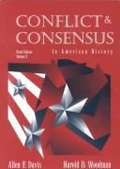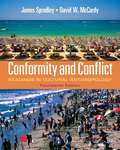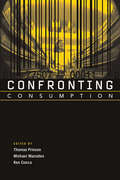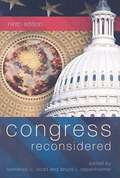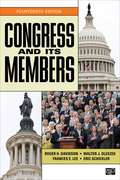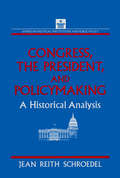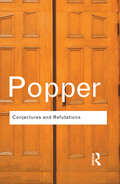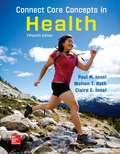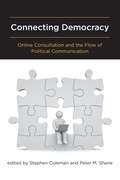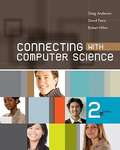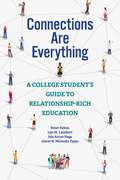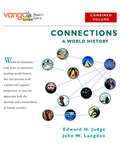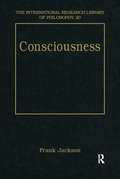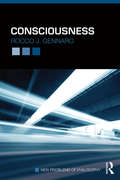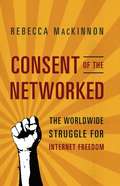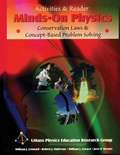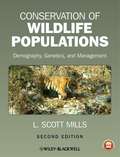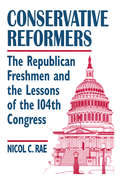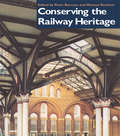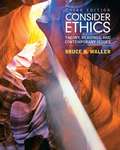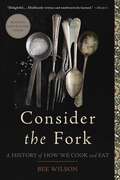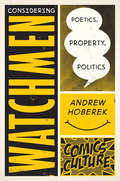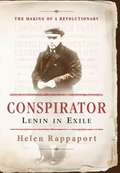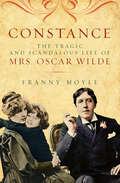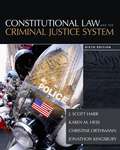- Table View
- List View
Conflict and Consensus in Modern American History, Volume 2
by Harold D. Woodman Allan DavisA look at American politics during the last 150 years and a discussion of the developments in political theory.
Conformity And Conflict: Readings In Cultural Anthropology
by James Spradley David W. MccurdyDemonstrate the nature of culture and its influence on people's lives. For over 40 years, the best-selling Conformity and Conflict has brought together original readings and cutting edge research alongside classic works as a powerful way to study human behavior and events. Its readings cover a broad range of theoretical perspectives and demonstrate basic anthropological concepts. The Fourteenth Edition incorporates successful articles from past editions and fresh ideas from the field to show fascinating perspectives on the human experience. Teaching and Learning Experience Personalize Learning -MyAnthroLab delivers proven results in helping students succeed, provides engaging experiences that personalize learning, and comes from a trusted partner with educational expertise and a deep commitment to helping students and instructors achieve their goals. Improve Critical Thinking -Articles, article introductions and review questions encourage students to examine their assumptions, discern hidden values, evaluate evidence, assess their conclusions, and more! Engage Students -Section parts, key terms, maps, a glossary and subject index all spark student interest and illustrate the reader's main points with examples and visuals from daily life. Support Instructors -Teaching your course just got easier! You can create a Customized Text or use our Instructor's Manual, Electronic "MyTest" Test Bank or PowerPoint Presentation Slides. Additionally, Conformity and Conflict's part introductions parallel the basic concepts taught in introductory courses - which allow the book to be used alone as a reader or in conjunction with a main text. Note:MyAnthroLab does not come automatically packaged with this text. To purchase MyAnthroLab, please visitwww. MyAnthroLab. comor you can purchase a valuepack of the text + MyAnthroLab (at no additional cost): VP ISBN-10: 0205176011/ISBN-13: 9780205176014
Confronting Consumption (The\mit Press Ser.)
by Ken Conca Michael Maniates edited by Thomas PrincenComforting terms such as "sustainable development" and "green production" frame environmental debate by stressing technology (not green enough), economic growth (not enough in the right places), and population (too large). Concern about consumption emerges, if at all, in benign ways; as calls for green purchasing or more recycling, or for small changes in production processes. Many academics, policymakers, and journalists, in fact, accept the economists' view of consumption as nothing less than the purpose of the economy. Yet many people have a troubled, intuitive understanding that tinkering at the margins of production and purchasing will not put society on an ecologically and socially sustainable path. Confronting Consumption places consumption at the center of debate by conceptualizing "the consumption problem" and documenting diverse efforts to confront it. In Part 1, the book frames consumption as a problem of political and ecological economy, emphasizing core concepts of individualization and commoditization. Part 2 develops the idea of distancing and examines transnational chains of consumption in the context of economic globalization. Part 3 describes citizen action through local currencies, home power, voluntary simplicity, "ad-busting," and product certification. Together, the chapters propose "cautious consuming" and "better producing" as an activist and policy response to environmental problems. The book concludes that confronting consumption must become a driving focus of contemporary environmental scholarship and activism.
Congress Reconsidered, 9th Edition
by Bruce I. Oppenheimer Lawrence C. DoddAlways a classic, Dodd and Oppenheimer's Congress Reconsidered is the recognized source for in-depth, cutting-edge scholarship on Congress geared to undergraduates. Thoroughly updated -- with ten brand new pieces and the others completely revised -- this ninth edition includes cogent, timely analysis of the 2008 congressional elections, as well as coverage of: <P><P> * the 110th Democratic Congress,specifically its energy policy, its handling of the Iraq War, and its taxing and spending; <P> * the role of committees in Congress; <P> * leadership by women and minorities in Congress; <P> * the effects of campaign finance reform; <P> * differences in legislative activity between the Republican and Democratic Congresses; <P> * party coalition-building across the postwar era; <P> * and perspective on campaigns, elections,and political careers from member of Congress Daniel Lipinski.
Congress and Its Members (14th Edition)
by Frances E. Lee Eric Schickler Roger H. Davidson Walter J. OleszekThis book is meant for general readers seeking an introduction to the modern Congress as well as for college or university students taking courses on the legislative process or national policy making.
Congress, the President and Policymaking: A Historical Analysis
by Jean Reith SchroedelThe underlying theoretical premise of this text is that the separation between the executive and legislative functions has important policy consequences and has influenced legislative outcomes. The study analyzes the pattern of interaction on banking bill introductions over the past 150 years.
Conjectures and Refutations: The Growth of Scientific Knowledge
by Karl PopperConjectures and Refutations is one of Karl Popper's most wide-ranging and popular works, notable not only for its acute insight into the way scientific knowledge grows, but also for applying those insights to politics and to history. It provides one of the clearest and most accessible statements of the fundamental idea that guided his work: not only our knowledge, but our aims and our standards, grow through an unending process of trial and error.
Connect Core Concepts In Health (Fifteenth Edition)
by Walton T. Roth Paul M. InselLet’s focus on the science of Health! ConnectCore Concepts in Health integrates innovative learning technologies and thelatest scientifically driven information to create a complete instructionalsystem for students and teachers. Withup-to-date coverage in every chapter Connect Core Concepts in Healthencourages students to reflect on their choices as a foundation for ahealthy life.
Connecting Democracy: Online Consultation and the Flow of Political Communication (The\mit Press Ser.)
by Stephen Coleman Peter M. ShaneAn investigation of the effect of government online forums on democratic practices in the United States and Europe.The global explosion of online activity is steadily transforming the relationship between government and the public. The first wave of change, “e-government,” enlisted the Internet to improve management and the delivery of services. More recently, “e-democracy” has aimed to enhance democracy itself using digital information and communication technology. One notable example of e-democratic practice is the government-sponsored (or government-authorized) online forum for public input on policymaking. This book investigates these “online consultations” and their effect on democratic practice in the United States and Europe, examining the potential of Internet-enabled policy forums to enrich democratic citizenship.The book first situates the online consultation phenomenon in a conceptual framework that takes into account the contemporary media environment and the flow of political communication; then offers a multifaceted look at the experience of online consultation participants in the United States, the United Kingdom, and France; and finally explores the legal architecture of U.S. and E. U. online consultation. As the contributors make clear, online consultations are not simply dialogues between citizens and government but constitute networked communications involving citizens, government, technicians, civil society organizations, and the media. The topics examined are especially relevant today, in light of the Obama administration's innovations in online citizen involvement.
Connecting with Computing Science
by Greg Anderson David Ferro Robert HiltonWritten for the beginning computing student, this text engages readers by relating core computer science topics to their industry application. The book is written in a comfortable, informal manner, and light humor is used throughout the text to maintain interest and enhance learning. All chapters contain a multitude of exercises, quizzes, and other opportunities for skill application.
Connections Are Everything: A College Student's Guide To Relationship-rich Education
by Peter Felten, Leo M. Lambert, Isis Artze-Vega and Oscar R. Miranda TapiaConnections: A World History
by Edward H. Judge John W. LangdonConnections: A World History focuses on the connections within and between societies, combining a uniquely comprehensive and consistent map program with a strong pedagogical support and a narrative that students will actually read. Written by historians with years of experience teaching world history,Connections presents both a global and regional perspective, so students can appreciate both the diversity and connectedness of human societies. Concise chapters and a clear engaging narrative make the text accessible to a wide range of students. In addition, because students struggle with geography, the book includes significantly more maps than other texts-in most cases twice as many-and great care was taken to make them consistent and exceptionally clear. In each caption, the authors have provided guidance for reading the map and for connecting it to the surrounding text. To further help students succeed, marginal notes highlight major connections for easy review, and pronunciation guides appear after difficult names. Lastly, compelling vignettes introduce the themes of each chapter, concise excerpts from relevant primary sources allow students to hear the voices of the past, and an extensive chapter review section is designed to help students test themselves and succeed in this difficult course.
Consciousness: Essays On Ned Block's Philosophy Of Mind And Consciousness (The International Research Library of Philosophy #Vol. 20)
by Frank JacksonBrings together some of the most important research publications on the philosophical problem of consciousness. It includes a detailed introduction that surveys the leading issues in the current debate.
Consciousness: New Essays On Psychopathology And Theories Of Consciousness (New Problems of Philosophy)
by Rocco J GennaroConsciousness is arguably the most important interdisciplinary area in contemporary philosophy of mind, with an explosion of research over the past thirty years from philosophers, psychologists, and scientists. It is also perhaps the most puzzling aspect of the world despite the fact that it is familiar to each of us. Consciousness also seems resistant to any straightforward physical explanation. This book introduces readers to the contemporary problem of consciousness, providing a clear introduction to the overall landscape and a fair-minded critical survey of various theories of consciousness. Beginning with essential historical background to the problem of consciousness, Rocco Gennaro explores the following key topics and debates: the metaphysical problem of consciousness, including varieties of dualism and materialism; consciousness and neuroscience, particularly the question of whether consciousness can be reduced to brain activity or attentional mechanisms; representational and cognitive theories of consciousness; consciousness and psychopathology; animals, machines, and consciousness. Extensive use is made of interesting phenomena throughout the book, ranging from blindsight, synaesthesia, and change blindness to phantom limb syndrome, split-brain cases, and dissociative identity disorder (DID). The inclusion of chapter summaries, annotated further reading, and a glossary make this book essential reading for anyone seeking a clear and informative overview of the problem of consciousness, not only in philosophy but related fields such as psychology and cognitive science.
Consent of the Networked: The Worldwide Struggle For Internet Freedom
by Rebecca Mackinnon<P>The Internet was going to liberate us, but in truth it has not. For every story about the web's empowering role in events such as the Arab Spring, there are many more about the quiet corrosion of civil liberties by companies and governments using the same digital technologies we have come to depend upon. <P> Sudden changes in Facebook's features and privacy settings have exposed identities of protestors to police in Egypt and Iran. Apple removes politically controversial apps at the behest of governments as well as for its own commercial reasons. Dozens of Western companies sell surveillance technology to dictatorships around the world. <P>Google struggles with censorship demands from governments in a range of countries--many of them democracies--as well as mounting public concern over the vast quantities of information it collects about its users. <P> In Consent of the Networked, journalist and Internet policy specialist Rebecca MacKinnon argues that it is time to fight for our rights before they are sold, legislated, programmed, and engineered away. Every day, the corporate sovereigns of cyberspace make decisions that affect our physical freedom--but without our consent. <P>Yet the traditional solution to unaccountable corporate behavior--government regulation--cannot stop the abuse of digital power on its own, and sometimes even contributes to it. <P> A clarion call to action, Consent of the Networked shows that it is time to stop arguing over whether the Internet empowers people, and address the urgent question of how technology should be governed to support the rights and liberties of users around the world.
Conservation Laws and Concept-Based Problem-Solving (Minds on Physics)
by University of Massachusetts StaffThe activities in this book are designed to get you thinking about and doing physics in a way that is a lot closer to the way professional scientists think about and do science. You will learn by communicating your ideas with your teacher and with other students, and by trying to make sense of the ideas presented in the book.
Conservation of Wildlife Populations: Demography, Genetics, and Management
by L. Scott MillsPopulation ecology has matured to a sophisticated science with astonishing potential for contributing solutions to wildlife conservation and management challenges. And yet, much of the applied power of wildlife population ecology remains untapped because its broad sweep across disparate subfields has been isolated in specialized texts. In this book, L. Scott Mills covers the full spectrum of applied wildlife population ecology, including genomic tools for non-invasive genetic sampling, predation, population projections, climate change and invasive species, harvest modeling, viability analysis, focal species concepts, and analyses of connectivity in fragmented landscapes. With a readable style, analytical rigor, and hundreds of examples drawn from around the world, "Conservation of Wildlife Populations (2nd ed)" provides the conceptual basis for applying population ecology to wildlife conservation decision-making. Although targeting primarily undergraduates and beginning graduate students with some basic training in basic ecology and statistics (in majors that could include wildlife biology, conservation biology, ecology, environmental studies, and biology), the book will also be useful for practitioners in the field who want to find - in one place and with plenty of applied examples - the latest advances in the genetic and demographic aspects of population ecology. Additional resources for this book can be found at: www.wiley.com/gomillswildlifepopulations.
Conservative Reformers: The Freshman Republicans in the 104th Congress
by Nicol C. RaeNicol Rae's engaging account of the Republican revolutionaries' freshman year in Congress persuasively demonstrates that the precepts set forth by Madison in Federalist 10 and 51 are still in force in our remarkably stable political system. The 73 Republican freshmen who entered the House of Representatives after the 1994 election were a well-organized group with majority status and a commitment to change. This book examines the extent to which they were successful in redirecting policy and reforming the institutions of representative government -- and the extent to which those same institutions moderated, and even frustrated, efforts to introduce radical, rapid -- indeed revolutionary -- change. Contrasts are drawn both with the role of the Republican freshmen in the Senate and with the power of the President as manifested in the 1995-96 budget battle. The book is based on interviews conducted by the author when he was an APSA Congressional Fellow in the offices of Rep. George P. Radanovich, president of the freshman Republican class, and Sen. Thad Cochran, chairman of the Senate Republican Conference.
Conserving the Railway Heritage
by Michael Stratton Peter BurmanGreat Britain not only invented the main-line railway but has also led the way in it's preservation - not just locomotves and carriages but also the buildings and structures that bear witness to the confidence of railway developers, architects and engineers. This book defines the nature of the railway heritage - from signalboxes, viaducts, tunnels and locomotive depots - and then discusses priorities and the best practice for it's conservation. The subject is a strongly topical one due to current concern over privatization, the effects of planned high-speed rail links and lively debates concerning the role of the enthusiast in railway preservation.
Consider Ethics: Theory, Readings, and Contemporary Issues
by Bruce N. WallerOffering a balance of theory and applications and a mix of text and readings, Consider Ethics begins with chapters covering ethical theory, each of which is followed by related, classical readings. The book concludes with an examination of six contemporary ethical issues presented in a pro/con format with introductory material that places each issue in context. Featuring selections from the world's most influential philosophers, this combination of primary texts and explanatory pedagogy presents the material in a clear, accessible way that does not sacrifice rigor. Making connections among different ethical theories throughout, the text helps students to engage the subject matter and apply theories to important contemporary ethical issues.
Consider the Fork: A History of How We Cook and Eat
by Bee WilsonSince prehistory, humans have striven to tame fire and ice, and have braved the business ends of mashers, scrapers, and razor-sharp knives--all in the name of creating something delicious (or, at least, edible). The technology of food matters even when we barely notice it is there, but in recent years kitchen technology has become increasingly elaborate and eye-catching, transforming the old-fashioned home kitchen into a bristling stainless steel laboratory. Far from a new development, however, the modern kitchen is only the most recent iteration of an ancient lineage of food technology, as acclaimed food historian Bee Wilson reveals in Consider the Fork. Many of our technologies for preparing food have remained strikingly consistent for thousands of years. The Greeks and Romans already had pestles and mortars. Knives--perhaps mankind's most important gastronomic tool--predate the discovery of that other basic technology, fire. Other tools emerged quite suddenly (like the microwave, whose secrets were unlocked during radar tests conducted during World War II) or in fits and starts (like the fork, which had to endure centuries of ridicule before finally gaining widespread acceptance). For every technology that has endured, others have fallen by the wayside. We no longer feel the need for andirons and bastables, cider owls and dangle spits, even though in their day these would have seemed no more superfluous than our oil drizzlers and electric herb choppers. The evolution of food technology offers a unique window into human history, and Wilson blends history, science, and personal anecdotes as she traces the different technologies that have shaped--or slashed, pounded, whisked, or heated (and reheated)--our meals over the centuries. Along the way she reveals some fascinating facts--showing, for instance, how China's cuisine, its knives, and its eating utensils are all the product of the country's historically scarce fuel supply. To conserve energy, chefs rendered their ingredients quick-cooking by using large, multi-purpose chopping knives to reduce food to small, bite-sized morsels. This technique, in turn, gave rise to the chopstick, which cannot cut. What's more, the discovery of the knife--in Asia and elsewhere--was likely what gave humans our distinctive overbite. Before humans learned to fashion knives out of sharpened rocks, many of us cut our food by clamping it in our front teeth, which gave us perfectly aligned rows of teeth. But Wilson shows that, far from being adventurous innovators, cooks are a notoriously conservative bunch, and only adopt new technologies with great reluctance. The gas range revolutionized cooking when it was first introduced in the 19th century by promising to end "hearth deaths," a constant danger for women wearing billowing, flammable clothing. But indoor gas cooking--safer and more efficient--was nevertheless greeted with widespread suspicion when it was first introduced. Many chefs feared it would taint their food or poison their guests. The same hold true for the refrigerator, which was initially condemned as an unnatural technology that risked changing the fundamental "essence" of food. Perhaps the one exception to this technophobia, says Wilson, was the egg beater, new patents for which proliferated so astonishingly in late 19th-century America. In this fascinating history, Wilson reveals the myriad innovations that have shaped our diets today. An insightful look at how we've changed food and how food has changed us, Consider the Fork reveals the astonishing ways in which the implements we use in the kitchen affect what we eat, how we eat, and how we relate to food.
Considering Watchmen: Poetics, Property, Politics
by Andrew HoberekAlan Moore and Dave Gibbons's Watchmen has been widely hailed as a landmark in the development of the graphic novel. It was not only aesthetically groundbreaking but also anticipated future developments in politics, literature, and intellectual property. Demonstrating a keen eye for historical detail, Considering Watchmen gives readers a new appreciation of just how radical Moore and Gibbons's blend of gritty realism and formal experimentation was back in 1986. The book also considers Watchmen's place in the history of the comics industry, reading the graphic novel's playful critique of superhero marketing alongside Alan Moore's public statements about the rights to the franchise. Andrew Hoberek examines how Moore and Gibbons engaged with the emerging discourses of neoconservatism and neoliberal capitalism, ideologies that have only become more prominent in subsequent years. Watchmen's influences on the superhero comic and graphic novel are undeniable, but Hoberek reveals how it has also had profound effects on literature as a whole. He suggests that Watchmen not only proved that superhero comics could rise to the status of literature--it also helped to inspire a generation of writers who are redefining the boundaries of the literary, from Jonathan Lethem to Junot Díaz. Hoberek delivers insight and analysis worthy of satisfying serious readers of the genre while shedding new light on Watchmen as both an artistic accomplishment and a book of ideas.
Conspirator: Lenin in Exile
by Helen RappaportThe father of Communist Russia, Vladimir Ilych Lenin now seems to have emerged fully formed in the turbulent wake ofWorldWar I and the Russian Revolution. But Lenin’s character was in fact forged much earlier, over the course of years spent in exile, constantly on the move, and in disguise. In Conspirator, Russian historian Helen Rappaport narrates the compelling story of Lenin’s life and political activities in the years leading up to the revolution. As he scuttled between the glittering capital cities of Europe--from London and Munich to Vienna and Prague--Lenin found support among fellow émigrés and revolutionaries in the underground movement. He came to lead a ring of conspirators, many of whom would give their lives in service to his schemes. A riveting account of Lenin’s little-known early life, Conspirator tracks in gripping detail the formation of one of the great revolutionaries of the twentieth century.
Constance: The Tragic and Scandalous Life of Mrs. Oscar Wilde
by Franny Moyle"Tells the poignant story of Constance in the aftermath of Wilde's trials and imprisonment, and of her brave attempts to keep in contact with him despite her suffering." --The Irish TimesIn the spring of 1895 the life of Constance Wilde changed irrevocably. Up until the conviction of her husband, Oscar, for homosexual crimes, she had held a privileged position in society. Part of a gilded couple, she was a popular children's author, a fashion icon, and a leading campaigner for women's rights. A founding member of the magical society The Golden Dawn, her pioneering and questioning spirit encouraged her to sample some of the more controversial aspects of her time. Mrs. Oscar Wilde was a phenomenon in her own right.But that spring Constance's entire life was eclipsed by scandal. Forced to flee to the Continent with her two sons, her glittering literary and political career ended abruptly. She lived in exile until her death.Franny Moyle now tells Constance's story with a fresh eye. Drawing on numerous unpublished letters, she brings to life the story of a woman at the heart of fin-de-siècle London and the Aesthetic movement. In a compelling and moving tale of an unlikely couple caught up in a world unsure of its moral footing, Moyle unveils the story of a woman who was the victim of one of the greatest betrayals of all time.
Constitutional Law And The Criminal Justice System
by Kären M. Hess J. Scott Harr Jonathan Kingsbury Christine H. OrthmannMarket-leading CONSTITUTIONAL LAW AND THE CRIMINAL JUSTICE SYSTEM, 6th Edition, uses real-world illustrations, succinct case summaries, and proven learning tools to equip readers with a solid understanding of our often-complex Constitution and criminal justice system. Avoiding confusing "legalese", the book features more than 200 plainly written, summarized cases that introduce readers to the most influential and relevant cases. It also thoroughly covers the Fourth and Fifth Amendments, exploring their application to issues relevant to criminal justice: reasonable search and seizure, double jeopardy, and testifying against oneself. The sixth edition includes expanded discussions of the First and Second Amendments as well as cutting-edge coverage of such high-profile topics as immigration, terrorism/homeland security, death row, and many others.
